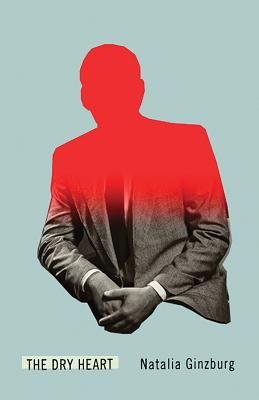The Dry Heart (Paperback)

Staff Reviews
A little novella with a lot of emotional heft and complexity. The narrator, a woman in postwar Italy, pines for companionship, deals with the indifference of egocentric men, and discovers that lust and revulsion often go hand in hand. With its intimate candidness and unadorned style, The Dry Heart feels like a first-person Jeanne Dielman.
— Cosmo
Our narrator has shot her husband between the eyes. Now she is wandering around town, piecing together what led her here. A tale of cruelty and lust and repulsion and bad marriages, this tiny gem of a novella, recently reissued by New Directions, is one of the best Natalia Ginzburg ever wrote - she is one of the best 20th century Italian writers, read everything - and this book will sate your Ferrante fever if you're still feeling its absence.
— MadeleineDescription
Finally back in print, a frighteningly lucid feminist horror story about marriage
The Dry Heart begins and ends with the matter-of-fact pronouncement: “I shot him between the eyes.” As the tale—a plunge into the chilly waters of loneliness, desperation, and bitterness—proceeds, the narrator's murder of her flighty husband takes on a certain logical inevitability. Stripped of any preciousness or sentimentality, Natalia Ginzburg's writing here is white-hot, tempered by rage. She transforms the unhappy tale of an ordinary dull marriage into a rich psychological thriller that seems to beg the question: why don't more wives kill their husbands?
About the Author
Natalia Ginzburg (1916–1991), “who authored twelve books and two plays; who, because of anti-Semitic laws, sometimes couldn’t publish under her own name; who raised five children and lost her husband to Fascist torture; who was elected to the Italian parliament as an independent in her late sixties—this woman does not take her present conditions as a given. She asks us to fight back against them, to be brave and resolute. She instructs us to ask for better, for ourselves and for our children” (Belle Boggs, The New Yorker).
Frances Frenaye (1908–1996) was an American translator of French and Italian literary works. She worked at the Italian Cultural Institute from 1963 to 1980 and was responsible for editing its newsletter. She won the Denyse Clairouin Memorial Award (1951) for her translation from French to English of Georges Blond’s The Plunderers and J.H.R. Lenormand’s Renee. She also wrote for an Italian newspaper, Il Mondo, for some time. Frenaye graduated from Bryn Mawr College and spent 50 years living in Manhattan before dying in Miami Beach.
Praise For…
Originally published in 1947, The Dry Heart is by far Ginzberg’s strangest work of fiction, a taught psychological thriller laced with horror about a woman who — very matter-of-factly in the first few sentences — murders her husband. “I shot him between the eyes,” the nameless narrator says, then goes out for coffee. Short enough to read in one sitting, it’s a feminist classic that exposes the dark side of marriage in clean, captivating prose.
— Chicago Tribune
Marriage, which had seemed an enchanting escape from her tedious, impoverished isolation—the “worn gloves and very little spending money,” the “dingy boarding-house,” the chilly schoolroom in which she taught Ovid—is in every way disappointing. (It probably doesn’t help that the husband’s mistress has told her she looks “like too much of a simple country girl” to murder anyone.) The prose is plain, direct but restrained, and much goes unsaid. Domestic life, its frustrations and miseries, occupies the foreground, the outside world barely discernible at the edges.
— Lidija Haas - Harper's
Unvarnished: Ginzburg, it's clear, is a master of the deceptively simple plot. To say that she's understated is itself a serious understatement. This slim, swift book was first published in Italy in 1947, but it feels chillingly modern. Haunting, spare, and utterly gorgeous, Ginzburg's novel is a classic.
— Kirkus (starred)
Ginzburg modernizes the form...Between generational differences, genealogical secrets, former and secret lovers, and the desires and limitations related to real and aspirational social milieux, Ginzburg seems to suggest that in the sphere of the family there is always more to tell, and differently.
— Los Angeles Review of Books
A flawlessly negotiated descent into the deep and dangerous chasm separating love’s fantasies from life’s realities.
— Los Angeles Times
What impels her forward is the voice: free, pellucid, almost always first-person, interested not in the long view but in the here and now.
— The New Republic
Her observations are swift and exact, usually irradiated by an unruly and often satirical humor. The instrument with which she writes is fine, wonderfully flexible and keen, and the quality of her attention is singular. The voice is pure and unmannered, both entrancing and alarming, elegantly streamlined by the authority of a powerful intelligence.
— Deborah Eisenberg - The New York Review of Books
This book is a Roman candle — quick and explosive.
— The New York Times
Where does style come from? Is it knowingly constructed or unconsciously secreted? Invented or inherited? These questions dog me whenever I read Ginzburg, whose thumbprint is so unmistakable, so inscribed by her time, yet whose work stands so solidly that it requires no background information to appreciate.
— The New York Times
Ginzburg never raises her voice, never strains for effect, never judges her
creations. Though blessed with the rhythms and tensile strength of verse, her
language is economical and spare, subordinate to the demands of the story.
Like Chekhov, she knows how to stand back and let her characters expose
their own lives, their frailties and strengths, their illusions and private griefs.
The result is nearly translucent writing—writing so clear, so direct, so seemingly
simple that it gives the reader the magical sense of apprehending the world for
the first time.
— Michiko Kakutani - The New York Times
It’s good to have The Dry Heart back.
— Joan Acocella - The New Yorker
I’m utterly entranced by Ginzburg’s style—her mysterious directness, her salutary ability to lay things bare that never feels contrived or cold, only necessary,
honest, clear.
— Maggie Nelson

